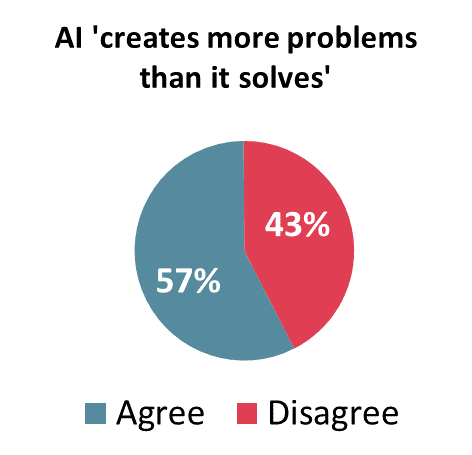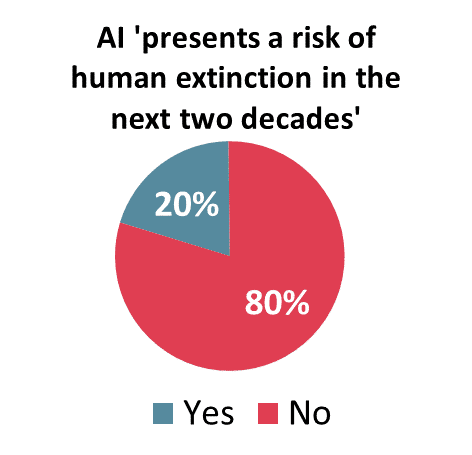- A majority Australians see AI as a negative
- 20% believe it will end humanity in the next 20 years.
- ANZ businesses using AI fell in the last 12 months
- Using AI in safe and secure way remains a concern
- AI adopters more likely to report profitability increase
Artificial intelligence (AI) is about as popular as a coal-fired power station in the public mind, with a majority of Australians (57%) believing artificial intelligence creates more problems than it solves, according to new research.
The findings by Roy Morgan, following a poll of nearly 1500 people earlier this month, found that women, older people and those living outside of capital cities are more wary of AI and its benefits.
On top of that one in five (20%) Australians believe AI presents a risk of human extinction in the next 20 years.
Women (62%) are far more likely to agree that artificial intelligence (AI) creates more problems than it solves, compared to males (52%). Among the over 50s, 65% of 50-64-year-olds and 64% of those aged 65+ have a negative view.
When it comes to regional and rural Australia, 61% sit on the more problems than it solves side, compared to 56% in the capital cities.
And even younger generations are sitting on the fence, with just 49% of under 35s giving AI the benefit of the doubt on its positive impact.


Source: Roy Morgan Snap SMS Survey: August 9-11, 2023. Base: Australians 16+, n=1,481. Weighted results.
When it comes to those fearing Skynet T-1000s will terminate us all by 2043, more than a third of Tasmanians Tasmania (37%) and around a quarter of Western Australia and Perth residents (both 26%) and Melbournites (24%) believe the AI extinction threat is imininent. And 25% of those over aged 50-64 feel the same way, which doesn’t them with much time to spend their super on retirement.
Respondents who agreed that AI creates more problems than it solves were around three times more likely to say AI poses the risk of human extinction (28%) compared to 10% for those who disagreed.
The most common reasons given for seeing AI as a bigger problem was the potential for job losses, followed by the need for regulation and the ability for AI to be misused.
The feedback from survey respondents ranged from: “AI will create unemployment and further stupefy the population. Meanwhile we allow a technology with a greater capability to change life as humans have known it for millennia” to “The concepts of AI itself and what it can achieve sounds wonderful, but we live in a fallen world and there is unfortunately the potential for AI to become corrupted or used for the wrong purposes” and “As the law is not keeping up with AI we need laws to protect our rights to privacy, and to protect our children from any form of surveillance, abuse, intimidation or misuse of AI.”

Roy Morgan survey was conducted in conjunction with the ‘Campaign for AI Safety’, a lobby group created by the Queensland founder of Conjointly, Nik Samoylov, earlier this year.
A skeptic on the AI front, Samoylov is concerned about the dangers of AI when it comes to issues such as biosecurity and autonomous weapons and wants greater regulation to improve its safety.
“The poll suggests that people want government regulation to deal with these issues, including unknown consequences and new problems that AI will create,” he said.
“The Australian government does not have time to delay AI regulation, nor to delay banning the development of dangerous AI that can be misused or cause grave accidents.”
Business use stalls
While AI is is the new metaverse for startups and VC investors amid broader pessimism, CPA Australia’s third annual Business Technology Report, released today finds that business more broadly is wary of AI and despite the awareness generated by ChatGPT, adoption and usage has flatlined among businesses across the Asia-Pacific region
The survey of around 700 executives, conducted over the last three months, found that the number of businesses that have used AI in the preceding 12 months remained static, even though AI adopters more likely to report a profitability increase.
CPA Australia’s Gavan Ord said that while a lot of people have experimented with generative AI, many are still unsure about how they can use AI in a safe and secure way.
“It’s very fashionable to talk about using AI tools like ChatGPT. But the reality is that most small and medium-sized businesses are still considering how to integrate them,” he said.
“In other cases, they don’t have the resources to use them properly or maybe they just don’t feel like they need them.”
The CPA survey found that 55% of businesses have used AI tools, such as chatbots, in the last 12 months, but that percentage is unchanged from last year’s report.
There was a shift, however, and it relates to business size, with 68% of companies with 500 or more staff using AI in the last years, compared to 48% with fewer employees.
And tellingly, the ANZ region is already walking back on AI implementation, with Australian usage down from 49% to 41% year-on-year alongside a fall in New Zealand from 56% to 51%.
That stands in startup contrast to mainland China, where AI usage jumped over the 12 months from 58% to 69% and also rose in Malaysia from 48% to 53%.
Gavan Ord said that among respondents from businesses that reported an increase in profitability over the last 12 months, 64% used AI in some form, while that figure dropped to 52% in companies where their profitability remained largely the same or shrank.
“Our experience is that in many cases AI tools have become ubiquitous, such as basic predictive text tools in email and messenger products. It’s much less likely to involve the kinds of next-gen AI that we often see highlighted in the media,” Ord said.
“The real question businesses should be asking themselves is, ‘How could AI help me commercially’? The evidence suggests that where it’s being used, it generally proves successful.”
Read CPA Australia’s Business Technology Report is available here.
Credit: Source link


Comments are closed.